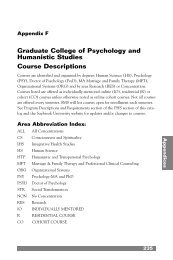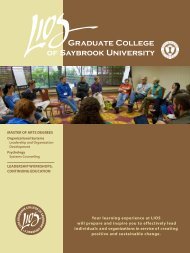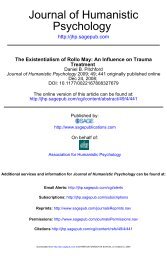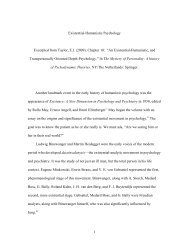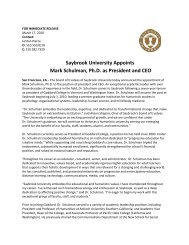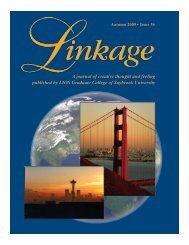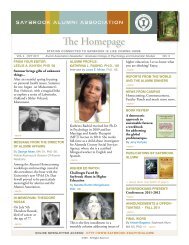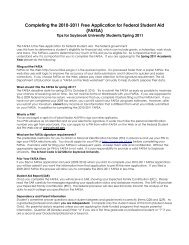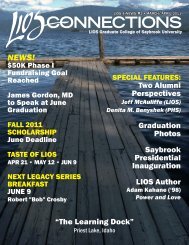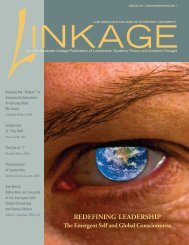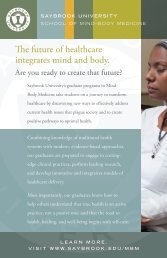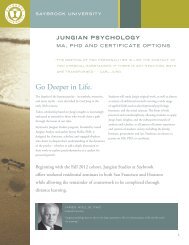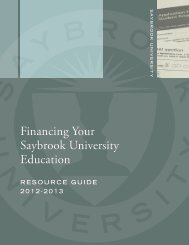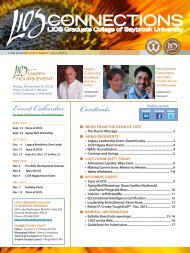Aug 2010 - Saybrook University
Aug 2010 - Saybrook University
Aug 2010 - Saybrook University
Create successful ePaper yourself
Turn your PDF publications into a flip-book with our unique Google optimized e-Paper software.
4<br />
GRADUATION con’t<br />
(continued from page three)<br />
like him would not lose their mothers due to a poor healthcare<br />
system as he and his two sisters had lost theirs. Marcelas<br />
epitomizes the motto of “Service above Self.” Marcelas’ sisters<br />
still attend First Place and Marcelas has moved on to a public<br />
school close to his home—yet his strength and unselfish love<br />
linger in our halls.<br />
“Where Do We Go From Here?” was the title Dr. King chose<br />
for the last book he wrote and the meaning of his question still<br />
haunts me—even now. And I wonder, are we walking towards<br />
chaos or towards community? The question remains: with all of<br />
our skills and knowledge, how will we, as a community and as<br />
individuals, answer Dr. King’s final question? For as Dr. King<br />
himself said in 1963, we must first stand up whenever we are<br />
able—whether we stand up locally, nationally, or globally.<br />
I was given the opportunity to stand up on a global level to<br />
work with a group of volunteers transforming communities<br />
in Kenya and Ethiopia. In both countries, I worked to provide<br />
technical assistance to the educators and administrators. I also<br />
learned from them, and took the fruit of those lessons back to<br />
First Place. In Ethiopia, for example, I learned to be even more<br />
humble. Our group was working in a tiny rural community that<br />
lacked the amenities Americans frequently take for granted,<br />
such as running water and electricity. Here, using Marvin<br />
Weisborg’s technique for finding common ground within a<br />
community, our group worked in an African village in which<br />
we were the only four English speakers. First, we worked to<br />
learn what was important to the most disenfranchised group<br />
there, the women, who married as early as eleven years old.<br />
Then we provided a micro-loan to these African women. Upon<br />
returning the following year, we learned that these astonishing<br />
women had established a childcare center that now serves<br />
eighty-two children, provides employment for six villagers,<br />
including a man, and allows five other women to attend school.<br />
Our long journey to the Bale Region of Ethiopia economically<br />
transformed this poor village, and spiritually transformed those<br />
of us who had the opportunity to be catalysts for this growth.<br />
It is unnecessary, however, to travel so far to make a difference.<br />
You can start with your own community regardless of its<br />
socioeconomics or size; in reality, poverty is often found in<br />
the middle of the most affluent communities, just hidden from<br />
view. Reaching back to pull others through is how we can<br />
actually experience the joy that “Service above Self” brings.<br />
Transformation begins with you. The service you give to others<br />
does not have to be a major or highly visible act. I have one<br />
more story for you:<br />
A young child who was very ill was taken by her family and put<br />
into a hospital to receive care. Because of her illness she had<br />
no choice but to live there in that hospital for two years. She<br />
celebrated two birthdays in the hospital where she lived, and<br />
when this child was finally released, she was five years old and<br />
returned into a family she no longer really knew. The nurses<br />
at the hospital would always say, “That’s your mother and<br />
your father,” but after two years of her young life spent in the<br />
hospital, these words held very little meaning. Then, once she was<br />
home and in her new surroundings, the adults around her wanted<br />
her to pretend that she had never left and punished her each time<br />
she showed any institutional behavior. At the age of nine her<br />
mother died just when this child was reestablishing a bond. Her<br />
father did not want to see his four children go into foster care,<br />
and so he sought help from the community. This search led him<br />
to a family who was considered influential in the community.<br />
The woman in that family became the legal guardian to the four<br />
children who had lost their mother. There was only one problem<br />
that the father was unaware of: the husband of the legal guardian<br />
was a pedophile and was given a key to the little girl’s home<br />
to watch over the four children while their father worked the<br />
late shift. For eight years this man tortured the little girls in that<br />
family. By the age of sixteen, the little girl ran away from home,<br />
but continued attending school.<br />
It was there that an English teacher who was unaware of her<br />
situation reached out to her. He saw that she was doodling and<br />
not paying attention, but instead of taking the paper from her and<br />
destroying it, he made a deal with her. He said, “I will give you a<br />
box of colored chalk and the blackboard in the back of the room<br />
to draw anything you want in exchange for the assigned English<br />
paper turned in to me by the end of the day.” She looked at him<br />
with suspicion but decided to trust him anyway. He kept his word<br />
and brought in the colored chalk, and after class let her draw on<br />
the blackboard. What he did not know was that she really could<br />
draw. After three days she had created a life-sized mural of three<br />
basketball players: two looking out into the distance, and the third<br />
sitting on the bench, his hands folded in anticipation of getting<br />
back into the game. The teacher was surprised at the creativity of<br />
the artwork and proud of his student. For two months the teacher<br />
left the mural, just as it had been drawn, up on the chalkboard<br />
and brought many people in to see it. Later, the student who had<br />
drawn the mural returned home with the resolve to become like<br />
the English teacher. She was so inspired that, six years later, she<br />
became an art teacher working in the<br />
inner city so that she could reach back<br />
and pull others through. That little girl<br />
was me!<br />
Where we go from here is continuing<br />
to make a difference in all of our<br />
communities through servant<br />
leadership. By acting as stewards and<br />
change agents, whether in your family,<br />
in your work environment, in nature, or<br />
out in the global community, your new<br />
skills and knowledge can bring about<br />
transformation. Each of you has special<br />
gifts to give others. “Service above<br />
Self” is what creates an enlightened<br />
community.<br />
Thank you!<br />
Doreen A. Harden-Cato, EdD<br />
Executive Director, First Place School



